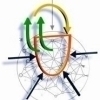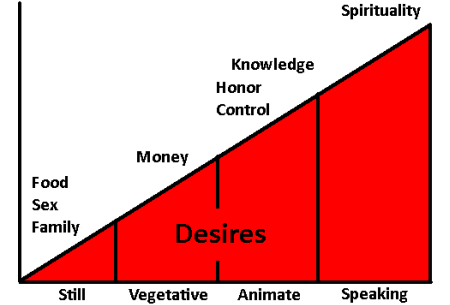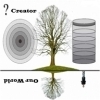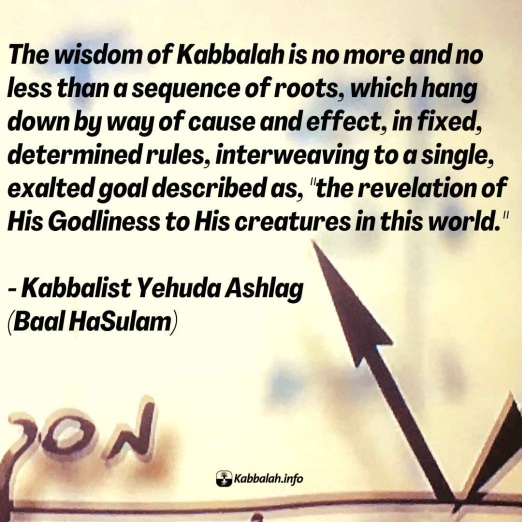Kabbalah has been clouded in confusion, myth, and misrepresentation because authentic Kabbalah has been hidden for thousands of years... until today

Why Is a Comprehensive Kabbalah University Appearing in Our Times?
Why Kabbalah is gaining so much popularity today, to a point where it's being studied worldwide.
Over the
generations, humanity developed via four levels of desire:
|
Level
|
Purpose
|
Desires
|
|
Still
|
Preservation of
form, species
|
Food, sex, family
|
|
Vegetative
|
Growth
|
Money
|
|
Animate
|
More freedom of
movement
|
Honor, control,
knowledge
|
|
Speaking
|
Attainment of the
higher level of reality
|
Spirituality
|

These
desires exist within each individual, and also are expressed in humanity’s
development.
At the
still level, just like all the matter of still objects in our corporeal reality
preserve those objects’ forms, likewise in humans: our desires for food, sex
and family preserve our continuation as a species. In the earliest days of
humanity’s evolution, people lived and worked only in order to fulfill these
desires. Think of cave-dwellers. They would spend their days going out hunting
and gathering food, and preparing shelter for themselves and their families in
order to survive.
At the
vegetative level, like how plants can grow, and absorb and excrete nutrients
for their growth, likewise with humans: our desires for money make us grow in
our integration with society. The desires at the still level are individual
desires; everybody has them. However, vegetative desires (money), already
relate to an exchange with other members of society, and start developing our
social relationships. Think of those cave-dwellers living and working to supply
for themselves and their families. At some point, they start realizing that
they need to fence themselves off from other people, define their property in
comparison to others’ property, and they start a system of trade.
At the
animate level, like how animals can move from place to place, likewise with
humans: desires for honor, control, pride, fame and knowledge increase our
movement among human society. As a sign of a bigger desire, people start
feeling the need to point out their uniqueness in relation to other people. In
terms of our evolutionary picture, think of the people who started trading with
each other. At a certain point, some people start thinking, “I can control this
system.” Then, systems of control such as governments start forming, Also,
people start priding themselves in what they produce, and wish to be honored
for their products, services and efforts as being better than what other people
offer and do. Knowledge then enters as a means to better understand, control,
express ourselves and further make sense of our lives. We develop ever more
intricately through science, technology and culture.
After
all the aforementioned development reaches a certain satiation point, the next
desire appears: the speaking desire. Just like how in corporeal reality, the
speaking level is depicted by the human being appearing in nature, with an
expanded ability to calculate his or her actions with seeming free choice:
likewise, in the human being, the speaking level of desire is expressed as the
desire for spirituality. Unlike the other desires, the goal of the desire for
spirituality cannot be pictured in our corporeal world. For example, at the
level of food, I can picture what it looks, smells, feels and tastes like to
eat a certain meal. Similarly, I can picture the goals and fulfillments in the
forms of sex, family, money, honor, control and knowledge. With spirituality,
however, I cannot picture the goal. Not with my corporeal senses. That is why
we have so many different beliefs, teachings and methods that each provide
different answers and approaches for the question: “What’s the goal of life?”
This
question about the goal – “What is the meaning of life?” - is the question that
most fundamentally characterizes the desire for spirituality. While we cannot
picture the goal of this desire’s fulfillment in our corporeal reality, we end
up feeling this desire as a certain lack of or attraction to “something
higher,” something different to what our current desires and senses offer us.
In other words, we feel that desire for spirituality as a certain kind of
dissatisfaction with all the other pleasures we can feel in food, sex, family,
money, honor, control and knowledge. We still get enjoyments through these worldly
pleasures. Yet, there is always some extra “space” within us, an emptiness that
never finds its lasting fulfillment. It is in that space, behind and beyond the
corporeal desires, where the question, “What is the meaning of life?” awaits
us.
The
wisdom of Kabbalah was made specifically for answering this question: “What is
the meaning of life?” Moreover, Kabbalists throughout the generations pointed
to our generation as the time when humanity en masse would start asking this question.
As Baal
HaSulam writes, in item 2 of the “Introduction to the Study of the Ten
Sefirot”:
Indeed,
if we set our hearts to answer but one very famous question, I am certain that
all these questions and doubts will vanish from the horizon, and you will look
unto their place to find them gone. This indignant question is a question that
the whole world asks, namely, “What is the meaning of my life?”
The main
difference between the era we are living in compared to past eras is that we
have reached a limit in the amount of fulfillment we can receive through food,
sex, family, money, honor, control and knowledge. Due to a larger desire
opening up that cannot be fulfilled by pleasures at those levels, humanity
starts trying to extract more pleasures from those same corporeal desires. No
matter how much variety and decoration we apply to the ways we receive our
food, sex, family, honor, control and knowledge, the feeling of questioning the
essence and meaning of our lives constantly lurks, gradually growing stronger.
This is
the desire that we work with in the wisdom of Kabbalah. It is called the “point
in the heart.” That is, “heart” is defined as the totality of our desires
(food, sex, family, money, honor, control, knowledge), and the “point in the
heart” is the desire for spirituality, i.e. the desire to discover the meaning
of life.
That is
why, today, such a comprehensive Kabbalah University is appearing in our times.
It is because today, the desire for spirituality has started developing in humanity.
An increasing amount of people are looking for answers in the form of proof – a
clear perception and sensation that fulfills this newly emerging desire.
This is
the purpose of the wisdom of Kabbalah: to fulfill this growing desire for
spirituality characteristic to our era. By attaining the higher level of
reality, a person experiences fulfillment in place of that empty feeling that
s/he cannot fulfill in the corporeal desires.
 The purpose of the wisdom of Kabbalah is to fulfill the growing desire for spirituality characteristic to our era.
The purpose of the wisdom of Kabbalah is to fulfill the growing desire for spirituality characteristic to our era.
 [Tweet This]
[Tweet This]

Do You Have to be Jewish to Study Kabbalah?
No. You don't have to be Jewish to study Kabbalah.
There are many misconceptions around who is and isn't permitted to study Kabbalah. Many of these misconceptions stem from past prohibitions, where for instance, unmarried men under the age of 40 as well as women were not allowed to study Kabbalah.
However, from the time of Kabbalist Isaac Luria (the Ari) onward, the wisdom of Kabbalah has been open to all men, women and children.
The only prerequisite for studying Kabbalah is a desire for spirituality. One can study even without a desire for spirituality, but those who will continue studying and find a path to fulfill their souls are the ones who will specifically turn to this wisdom in order to answer the question about the meaning of life.
Therefore, whether or not one is Jewish, or has or has not studied the Talmud is irrelevant for the study of Kabbalah. All that is relevant is one's desire: whether the wisdom responds to what one searches for.
In addition, Rav Avraham Yitzhak HaCohen Kook answered the question of who can study Kabbalah with the simple words: “Anyone who wishes it.”

Is Kabbalah Magic?
One of the popular misconceptions about Kabbalah is that it is magic.
However, there is no magic in Kabbalah.
The wisdom of Kabbalah is a method that
develops our ability to monitor our destiny and be independent of magical
forces and charms. In the writings of Kabbalist Isaac Luria, the Ari, he
prohibited the use of charms because they offer only psychological support.
Although some people believe that
certain objects hold magical forces, in truth, the magic lies in the
psychological support that a person attributes to the objects. Although this
psychological support could be helpful to a person in daily life, it has
nothing to do with the attainment of the higher level of reality that Kabbalah
speaks about.
Moreover, even if one can find some
immediate solace in the psychological support of certain objects or actions, in
the long term that person will not be in a better situation.
Through Kabbalah study, one enters into
a connection with reality's causal force, and the connection to the source of
reality overrides any influence of magicians or fortune tellers. They cease to
be able to predict a Kabbalah student's life, because the Kabbalah student's
connection to life's source shifts the person to a different, faster level of
development, where the higher level of reality and nature work differently on
such a person. Thus, in the long term, Kabbalah is the genuine solution for all
kinds of problems a person encounters, since it allows the person to connect to
the source of all problems and their remedies. As such, Kabbalists write about
the wisdom of Kabbalah, that is a "potion of life."

The Meaning of Kabbalah
The meaning of the word "Kabbalah" is "to receive."
In other words, Kabbalah is a wisdom of
how to receive pleasure in its optimal form.
The way we receive pleasure optimally is
by adding the intention to bestow above our reception of pleasure, which allows
for the continuous sustenance of pleasure. The method of Kabbalah is in how to
develop that intention to bestow above the will to receive.
Therefore, suppression of desires
has no place in Kabbalah. On the contrary, Kabbalah acknowledges the existence
of each and every desire, and explains how we can best and most effectively use our desires to reach the perfection of the higher level of reality.
As we develop in our Kabbalah studies,
we learn how to combine our inclinations and characteristics harmoniously,
attaching them to the process we undergo. Many desires that appear negative to
many people then spin into a positive direction. For example, take envy, lust,
and honor. There is a Kabbalistic maxim that says, "Envy, lust, and honor bring
a man out of the world" (Avot, 4:21).
The deeper meaning behind this maxim is
that the world that envy, lust, and honor bring us out from the world of the
will to receive with no intention to bestow applied to it. The world they bring
us to is the higher level of reality, i.e. where the intention to bestow rides
the will to receive. This, however, can take place only if we channel these
natural inclinations in a positive and beneficial direction, enabling us to
attain the perception and sensation of the higher level of reality.

Kabbalah Definition
Kabbalah, what is it? The wisdom of Kabbalah has been shrouded in myths and misconceptions. Here is Kabbalah's definition.
The wisdom of Kabbalah has been connected to religion, mysticism and mystics, Judaism, yoga, tarot cards, numerology, astrology, charms, amulets, magic, sacred geometry and that a person must be at least 40 years of age in order to study.
The reason for the misconceptions is
that Kabbalah is thousands of years old. The first person who discovered the
wisdom of Kabbalah was Adam HaRishon, who lived over 5,000 years ago. The
wisdom developed from Adam HaRishon's time until a significant transition in
the wisdom took place around 2,000 years ago, which left only a few unique
individuals to engage in it, i.e. in its authentic form.
Since then, Kabbalistic writings have
passed through the hands and minds of millions of people. Likewise, many who
have encountered Kabbalah have blended it with their own backgrounds, teachings
and understandings, without attaining what authentic Kabbalah was intended for.
This ongoing mixture over the generations has given rise to the numerous misconceptions
(read more about the misconceptions in the "Kabbalah and Magic"
section of this page, and in the "Myths about Kabbalah" section of
the website).
So what then is Kabbalah? As written
above, Kabbalist Yehuda Ashlag's definition of the wisdom of Kabbalah is as
follows:
This wisdom is no more and no less
than a sequence of roots, which hang down by way of cause and effect, in fixed,
determined rules, interweaving to a single, exalted goal described as, "the
revelation of His Godliness to His creatures in this world."

In plain English, this definition can
break down to the following:
 Kabbalah is a method by which any person can attain a higher level of reality.
Kabbalah is a method by which any person can attain a higher level of reality.
 [Tweet This]
[Tweet This]
It is important to note that it is a
method, an empirical method, not a belief. Also, any person can study it,
regardless of race, gender or nationality. "Attainment" means a clear
perception and sensation, not an idea, theory or philosophy.
The higher level of reality that one
attains through correct Kabbalah study has been given many names. As you can
see in Baal HaSulam's above definition, he uses the words "His
Godliness" to define the higher level of reality. You will also find words
in Kabbalistic texts such as the "Upper Force," "Upper
Light," "the Creator," "Nature," "God,"
"the Lord" and "the King," all describing that higher level
of reality.
What do these terms define?
They define a quality of bestowal and
love, which is the source of everything that exists in reality. This quality is
also defined as a desire to bestow, often cited as a "will to
bestow."
Opposite the higher level of reality is
us in our current level of reality. You could call it the "lower level of
reality." As the quality of the higher level of reality is bestowal,
opposite to it is the quality of reception, also called the "will to
receive." That is the quality of what is called "the creation"
in the wisdom of Kabbalah, or in Baal HaSulam's above definition, "the
creatures."
This then brings about the question: If
the wisdom of Kabbalah is a method where any person, while alive in this
lifetime, can attain a higher level of reality, which means attaining access to
a quality of bestowal, why would anybody want to do that?
The reasons why are as follows:
1) Transient Pleasure vs. Continuous
Pleasure
In our current level of reality, every
time we find pleasure, it dissipates. The pleasure neutralizes the desire. For
example, if you're hungry and you really want to eat, and you're handed your
favorite dish, then your first bite of that dish is pure bliss. The more you
continue to eat, the lesser the pleasure you feel. At a certain point, you'll
feel satiated: the desire to eat became quenched. Moreover, if you'd continue
eating, the same action that was giving you pleasure a few moments ago, you'd
start feeling sick.
Our problem in our current level of
reality is that we don't know how to sustain and increase our enjoyment. As a
will to receive pleasure, our inborn nature is such that pleasures fade away
upon their reception, they don't increase.
The wisdom of Kabbalah teaches us how we
can use our desire in a new direction, with what is called an "intention
to bestow." By applying this new use of our desire, we can start feeling
enjoyments in an opposite way to the way we currently feel them: where instead
of enjoyments fading away upon their impact, they increase and become
continuous.
 Kabbalah teaches us how we can use our desire in a new direction, with an "intention to bestow." By applying this new use of our desire, instead of enjoyments fading away upon their impact, they increase and become continuous.
Kabbalah teaches us how we can use our desire in a new direction, with an "intention to bestow." By applying this new use of our desire, instead of enjoyments fading away upon their impact, they increase and become continuous.
 [Tweet This]
[Tweet This]
2) Incomplete Perception vs. Complete
Perception
We live in a world of consequences, not
knowing why we're here, where we're from, where we're headed, what's the
purpose of us being here, and how everything is connected. We perceive a small
fragment of reality, limited within time, space and motion. No matter how much
we learn throughout our lives and throughout our human history, we never reach
a state where we feel we have complete perception. By attaining the higher
level of reality, we add that part that we're missing in our current level of
reality, and expanding our sense and understanding to form a complete picture.
3) Separation vs. Connection
We perceive ourselves as being separated
from billions of other people, and many more animals, plants and objects. We
construct our lives based on this separation, and encounter a life filled with
struggles, pursuits and conflicts, often feeling like we just need to survive
as best as we can until we ultimately perish. By attaining a higher level of
reality, we attain connection to everything around us, seeing everything and
everyone as pieces of a single puzzle, harmonious and integrated, like cells
and organs in a healthily functioning body.
Kabbalah Is a Method for Any Person to Attain the Higher Reality
What is Kabbalah? Although its origins are rooted in deep antiquity, from the time of ancient Babylon, the wisdom of Kabbalah has remained virtually hidden from humanity since it appeared more than four thousand years ago. To this very day, only a few know what Kabbalah really is.
For millennia, humanity was offered a wide variety of things under the name “Kabbalah”: spells, curses, and even miracles - all except for the method of Kabbalah itself. For over four thousand years, common understanding of Kabbalah has been cluttered with misconceptions and misinterpretations.
Therefore, first and foremost, the wisdom of Kabbalah needs to be made clear. Kabbalist Yehuda Ashlag (Baal HaSulam) provides the following definition in his article "The Essence of the Wisdom of Kabbalah":
This wisdom is no more and no less than a sequence of roots, which hang down by way of cause and effect, in fixed, determined rules, interweaving to a single, exalted goal described as, “the revelation of His Godliness to His creatures in this world.”
In simpler words, there is an upper, all-inclusive force, or “the Creator,” controlling everything in reality. All the world’s forces descend from this comprehensive force. Some of these forces are familiar to us, such as gravity or electricity, while there are forces of a higher order that act while remaining hidden to us.
Kabbalah holds the map or the knowledge of how these hidden forces are structured, and the laws by which they influence us. It teaches us (through books such as The Zohar and other means) how to develop a sense of these forces, and finally, discover their only purpose – to bring us to the revelation of the Creator, the all-inclusive law of nature, while living in this world.
Sign up for a Kabbalah course (live and self-study options available) »

Is Kabbalah a Religion?
Another common misconception about Kabbalah is that is a religion or mysticism.
Put simply, Kabbalah is not religion nor
mysticism.
There is nothing in the wisdom of Kabbalah about a belief in a
higher power. On the contrary, the wisdom of Kabbalah is a science: a science
of attaining how nature works and why.
Kabbalah teaches how any person can
attain the revelation of the higher level of reality. It is written: "For they
shall all know Me, from the least of them unto the greatest of them" (Jeremiah
31, 33). This means that every person will ultimately attain the complete
perception and sensation of reality in its entirety, and not just the limited
part we perceive with our five senses.

The Zohar (Sefer ha Zohar)
The Zohar is the greatest and strongest Kabbalistic composition of all time. Although its authorship is attributed to Rabbi Shimon Bar-Yochai, it was in fact his group of ten Kabbalists who attained a spiritual vessel, connecting into the ten
Sefirot at the level of the end of correction (
Gmar Tikkun), attaining the complete 125 spiritual levels of the soul’s ascent in order to attain that exalted degree, which is a major part of what gives
The Zohar its immense power.
The reason for
The Zohar being called “
Zohar,” which is Hebrew for “radiance,” is because of these Kabbalists reaching the highest degrees of spiritual attainment and expressing those degrees to us through the book.
The Zohar is written as a commentary to the Pentateuch, the five books of the Torah. Everything that Kabbalists discovered between the time of the First Temple and the Second Temple is expressed in
The Zohar at the level of the end of correction. Also, the uniquely integral way in which the book was written—where Rabbi Shimon spoke, Rabbi Aba wrote, and the other Kabbalists shared their revelations—makes it suitable for any person who will ever wish to use it to spiritually progress, as it contains a unifying inclusion of different viewpoints of the spiritual worlds.
The Zohar was concealed for a long time and only became revealed in the 11th century in Spain, thanks to Rabbi Moshe de Leon, then followed a few more stages of concealment and revelation until Kabbalist Yehuda Ashlag (Baal HaSulam) worked with it in the 20th century. Kabbalists pointed to these modern times as those when
The Book of Zohar would become revealed and even necessary for humanity to use in order to make a significant transition from what is called “exile to redemption,” i.e. a state of being locked in our egoism, where we prioritize self-benefit over the benefit of others and nature, to a state where we exit our egoism and become beneficial parts within the natural system that we share. This is why Baal HaSulam wrote his monumental
Sulam (Ladder) commentary to
The Book of Zohar.
It is written that
The Zohar is “caged behind a thousand locks,” which are locked with different keys so that if we read it without any preparation, we would have no idea what we should do with it or how to use it correctly. This is why Baal HaSulam wrote his
Sulam commentary as well as four introductions to
The Zohar, so that we would gain the keys to be able to unlock it and use it correctly.
Today, through the material that Baal HaSulam provided, we can develop a correct and spiritually-beneficial approach to
The Book of Zohar in order to use it as a source of great light, which we can attract into our lives, and which can spiritually progress us to the highest ultimate degrees that we are able to attain in our lives.


![]() The purpose of the wisdom of Kabbalah is to fulfill the growing desire for spirituality characteristic to our era.
The purpose of the wisdom of Kabbalah is to fulfill the growing desire for spirituality characteristic to our era.
![]() [Tweet This]
[Tweet This]







 Kabbalah International
Kabbalah International